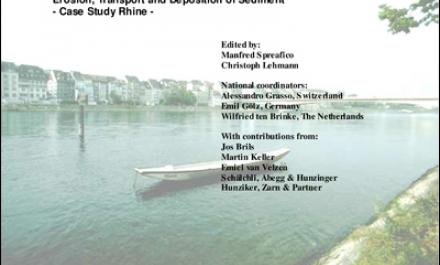Code

| Introduction | 1 | |
|
1 |
Description of the Rhine River Basin Overview Longitudinal and cross-sectional profiles Human impact Hydraulic Works Reservoirs and hydropower Water supply Water quality Population Land use Hydrometeorology Climate and Meteorology Hydrdrology Runoff regime of the River Rhine Influence of climate change on the runoff regime Travel times Hydrogeology Morphological landscape structure Soils |
7 7 8 11 11 20 24 26 30 30 31 31 33 33 36 40 42 43 44 |
| 2 2.1 2.1.1 2.1.2 2.1.3 2.1.4 2.2 |
Users Stakeholders of small alpine catchments Needs for protection (mainly natural hazards, soil loss) Power and drinking water supply (reservoir sedimentation, abrasion of turbines etc.) Construction (use of sediments, dredging) Other uses (habitat protection, recreation, environmental protection) Stakeholders of large lowland catchments |
47 47 47 48 48 48 49 |
| 3 3.1 3.2 3.2.1 3.2.2 3.2.3 3.3 |
Problems related to sediment management Torrents and small Alpine watersheds Large river systems Switzerland Germany The Netherlands Lakes |
51 |
| 4 4.1 4.1.1 4.1.2 4.2 4.2.1 4.3 4.3.1 4.3.2 4.3.3 4.3.4 4.3.5 4.3.5.1 4.3.5.2 4.3.5.3 4.3.6 4.3.7 4.3.7.1 4.3.7.2 4.3.7.3 4.3.7.4 4.3.7.5 |
Necessary sediment observation Switzerland Torrents Rivers The Netherlands Lakes Reservoir Sedimentation The Problem of Reservoir Sedimentation Consequences of reservoir sedimentation Sedimentation rate Reservoir sedimentation by turbidity currents Measures against reservoir sedimentation Measures in the catchment area Control of sedimentation within the reservoir Measures at the dam Todays's needs for an approach for Reservoir planning Examples Obstacles: Submerged Dams in Lake Grimsel Venting: Hydro Power Sarganserland Bypass-tunnel: Pfaffensprung Bypass-tunnel: Runcahez Sediment evacuation through power intake: Gübsensee |
57 57 57 58 60 61 62 62 62 53 64 64 65 65 66 67 68 68 70 71 73 74 |
|
5 |
Available sediment data Switzerland Historic background Sediment observations today Germany Historical Background River bed Geometry Geology Sediment transport Bed load Suspended load Grain size Petrographic composition Data storing The Netherlands Historical background Bed levels Available data on sediment transport Available data on grain size |
77 |
| 6 6.1 6.1.1 6.1.2 6.1.3 6.1.4 6.2 6.2.1 6.2.2 6.2.3 6.2.4 6.2.4.1 6.2.4.2 6.3 6.3.1 6.3.2 6.3.3 |
Monitoring equipments and methods Switzerland Bed load Suspended sediment Turbidity Suspended solid load Germany Geometry of the river bed Geology and sedimentology of the river bed Bed load Suspended load Permanent monitoring stations Cross-section measurements The Netherlands Riverbed Bed load Suspended load |
93 93 93 93 94 95 96 96 96 98 99 99 100 101 101 101 103 |
|
7 |
Estimation Techniques Switzerland Recommendation for the assessment of sediment yield in mountain streams Germany Estimation of sediment loads in the German Rhine General remarks Bed load Suspended sand load Total suspended load and wash load Sediment balance and sediment budget Comparison of hydrologic, geometric, and sediment transport data Morphological models The Netherlands |
105 105 105 109 109 109 110 110 111 111 114 115 116 |
|
8 |
Legal, administrative and organizational aspects Laws Switzerland Germany The Netherlands Regulations Switzerland Germany Bilateral and multilateral agreements and treaties Cooperation in international River basin committees Organizations responsible for monitoring Switzerland Germany The Netherlands |
119 |
| 9 9.1 9.2 |
Selected recommendations concerning sediment management Flushing and emptying dammed waters Extraction of gravel, sand and other materials from water courses |
125 125 126 |
| 10 10.1 10.2 10.3 10.4 10.5 10.6 |
Rhine sediment quality and its management Sediment quality and assessment Trends in Rhine sediment quality Contaminated sediment re-suspension risks Sediment management Towards a management plan for contaminated sediments Preliminary findings SEDI group |
127 127 128 129 130 130 132 |
| 11 11.1 11.1.1 11.1.2 11.1.3 11.1.4 11.2 11.2.1 11.2.2 11.2.3 11.3 11.3.1 11.3.2 11.3.3 |
Examples of sediment studies Switzerland River Alpine Rhine Sediment balance in the Thur catchment area Reduction of erosion in the Emme river: Study „Emme 2050" Assessment of sediment yield in the Weisse Lütschine, Canton of Bern Germany Bedload management at the Rhine River Selective transport and dispersion along the Upper Rhine - results of a long term field test using a petrographic tracer Suspended sediment transport and sediment management in the impounded section of the Upper Rhine The Netherlands Study German - Dutch border Morphological behaviour of bifurcations in the Dutch Rhine river system Sediment budget of the Dutch Rhine River system |
135 |
| 12 | Literature | 209 |
| General Information about the International Commission for the Hydrology of the Rhine basin (CHR) | 218 | |
| Publications of CHR | 219 |